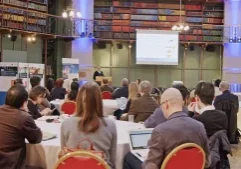New academic research commissioned by top 20 accountancy firm Kingston Smith LLP reveals that small to medium sized enterprises (SMEs) are aware that they need to improve their networks and connections to develop their businesses and grow, but do not know how to go about it. Last month, a launch event to highlight the findings was held at the Google campus.
The report, which was undertaken by the Business Schools of the Universities of Surrey and Greenwich, analysed data gathered from a survey of over 1,000 successful SME leaders, as well as from focus groups and in-depth discussions with 25 individual owner-managers including Nicky Rudd, MD of Padua Communications.
It reveals that, while 94% of SMEs considered direct referrals important to their continuing success, most regarded social media as ‘a necessary evil’. Meanwhile, although SMEs considered LinkedIn to be of equal importance to traditional networking events, and nearly 90% used networks and social media, over 35% of SMEs did not consider their use of these to be effective.
Professor David Gray of the University of Greenwich, who co-led the research, explains: “Successful SMEs are mindful of both the potential benefits, and dangers, of spending time networking on social media. While they value LinkedIn for showcasing their business and establishing their brand, they are wary of getting too sucked into discussions, losing sight of the need to find new customers. The same is true of Twitter – it can be a highly effective tool for SMEs when used in conjunction with other social media, such as the business’ website and blogs; but there is the danger that tweeting may replace genuine business activity.”
Meanwhile, the findings are clear that social media are not a substitute for face-to-face networking and events. Face-to-face networks are highly valued by SMEs, both to supplement a social media presence and in their own right. But the research shows that it is vital to be selective about these so as not to suffer from ‘event overload’. Having a clear strategy for networking events is just as important as having a marketing strategy.
Indeed, successful SMEs network with a number of different communities, integrating a combination of both offline and online methods. The challenge is how to integrate the two so that one complements the other.
Key recommendations
- develop a social capital strategy within their business plan
- have an effective policy for, and monitor, social capital based activities
- seek to achieve a realistic return on investment
- consider the wider benefits of social capital and maximise them.
Free marketing & PR resources
Sign up we’ll send you our free marketing and communications newsletter packed with helpful advice, along with details of our events.










